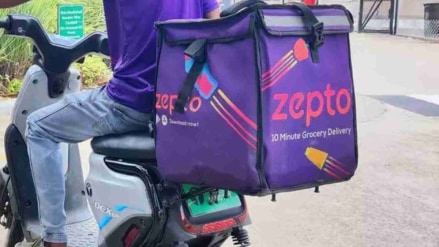Picture this: A dozen delivery workers lie on wooden benches in a cramped room, some on the floor, while their electric scooter batteries charge. A photograph from a Zepto dark store in Ramanthapur, Hyderabad, shows just this, exposing the ugly truth behind India’s 10-minute grocery delivery promise.
Dark stores seem to be living up to their name. Only 30-40% of dark stores across major platforms provide basic amenities like toilets, drinking water, or proper seating areas, according to Salauddin, national general secretary of the Indian Federation of App-Based Transport Workers. Workers spend 10-12 hours daily at these facilities “with inadequate break or rest time, especially during peak demand hours,” he says.
These working conditions have deteriorated further as quick commerce platforms move away from operating their own dark stores and adopt a franchisee model. The norm is that the movers and packers inside the dark stores must pack 90% of orders within 120 seconds to help store operators avoid penalties: Rs 1,000 for delays of 30 minutes to one hour; Rs 3,000 for 1-2 hours; and Rs 5,000 for 2-4 hours.
“Store owners don’t want to pay these fines. Instead, they put penalties on us — workers — for delays. Each store also has set targets for the day based on expected commissions from platform. Once this is met, owners themselves ask us to shut the stores and go home. This is a reason for a lot of late-night delivery disruptions across stores,” Manjunath K, a packer at a dark store facility in JP Nagar, Bengaluru, says.
While workers face deteriorating conditions, consumers are encountering their own transparency gaps. Unlike physical stores where expiry dates are clearly visible, quick commerce platforms do not display this information. The Food Safety and Standards Authority of India (FSSAI) in its December 2024 advisory mandated that products delivered through online platforms have a minimum shelf life of 30% or at least 45 days before expiry, at the time of delivery.
Yet, in practice, this continues to be ineffective as consumers cannot verify compliance since platforms don’t display expiry information on the app. “These platforms are buying dead-stock nearing end of shelf life from FMCG brands at a cheaper cost and pushing heavy discounts on such items,” says Sachin Taparia, founder of consumer advocacy group LocalCircles.
In a letter dated June 26 this year, Taparia wrote to Kamala Vardhana Rao, CEO of FSSAI, requesting to either update the Food Safety and Standards Amendment Regulation 2020 to mandate display of expiry dates online for all packaged food products, or revoke the clause that exempts food products in the Legal Metrology Packaged Commodity Rules 2017 amendment. “This will ensure that just like in physical retail stores where the consumer has the benefit of seeing the expiry date of products when buying, they have the same information available when buying online,” Taparia adds.
These transparency issues come as the industry faces regulatory crackdowns over safety violations that have resulted in licence cancellations across multiple facilities. Maharashtra’s Food and Drug Administration suspended Zepto’s Dharavi facility in May 2024 after discovering fungal growth on food products and expired items mixed with fresh stock. Telangana authorities shut down a Blinkit warehouse they described as “unhygienic and dusty,” containing Rs 1.34 lakh worth of contaminated and expired products. Similar enforcement actions have hit facilities across Pune, Bandra, Bhiwandi, and Hyderabad.
“The food safety lapses have underscored the regulatory grey zones that quick commerce operates in,” said Ashima Obhan, senior partner at Obhan & Associates. Multiple laws create overlapping liabilities—the Food Safety and Standards Act, Consumer Protection Act, and IT Act all apply, with “primary liability on ‘food business operators,’ a term that captures both platforms and franchise-run dark stores.”
The mounting regulatory pressure is being seen as a shift in enforcement approach. “Regulators are increasingly adopting a chain liability approach, where lapses at any point—whether in storage, last-mile delivery, or platform listing—can trigger enforcement across the entire ecosystem,” says Ashima Obhan, senior partner at Obhan & Associates.
This distinction is driving FMCG companies to urgently renegotiate contract engagements with q-comm platforms. Brands are demanding broad indemnity coverage to safeguard against regulatory penalties, product recall expenses, reputational harm and even rights to conduct periodic facility inspections or audits.
“Indemnity provisions may be included to allocate liability in the event of regulatory breaches and provide an additional measure of protection against associated risks.” says Rishikaa, senior associate at ADP Law Offices.
FMCG brands are also adopting proactive measures including “franchisee vetting protocols, third-party audits, and real-time IoT monitoring tracking temperature, humidity, and other factors. While these do raise related cost allocation concerns, these systems offer FMCG companies direct access to operational data and automated alerts for any deviations, enhancing oversight and responsiveness,” Ramya Suresh, partner at Saraf and Partners. However, “while contracts can apportion liability on paper, in practice, regulators and consumers expect shared accountability,” Obhan notes.
For now, the 10-minute promise seems to be increasingly dependent on who pays the hidden costs when the system breaks down.
